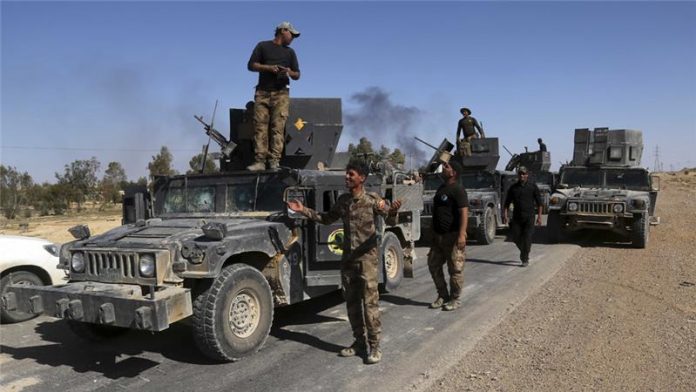As Iraqi forces continue to fight resistance posed by the Islamic State in Mosul, a group of armed civilians have also joined the battle against the militant group..
Lieutenant-General Raid Shakir Jawdat said security forces were in control of the center of Hammam al-Alil, about 15 kilometers south of Mosul.
He told Al-Hurra television that another Iraqi unit had advanced further up the western bank of the Tigris River and was just 4 kilometers from the airport.
Mosul, the last IS stronghold in Iraq, is being besieged by Iraqi and Kurdish Peshmerga forces seeking to recapture it as they continue to retake Iraqi territory from the Sunni extremists in the northern and western parts of the country.
Jawdat added that his forces had destroyed 17 bomb-laden cars, which had targeted them as they advanced north.
“[The battle for Hamman al-Alil] is very important — it’s the last town for us before Mosul,” Jawdat told reporters.
Iraqi helicopters were supporting the army, he said, backed also by jets from the U.S.-led air coalition.
The security forces’ advance from the south comes days after Iraqi special forces punched their way into the eastern part of Mosul, with Peshmerga forces blocking the northern access to the city.
The Reuters news agency reported seeing smoke rising from Mosul’s eastern districts as artillery, gunfire, and air strikes by the U.S.-led coalition could be heard on November 5.
The special forces have reportedly secured six neighborhoods in eastern Mosul and established a base of operations in the city.
But the advance of the Iraqi forces was slowed by IS-erected fortifications, which include trenches and berms that have turned the streets and alleys of some neighborhoods into hazardous mazes.
Snipers also fired from rooftops at each other and civilians emerged from the front lines waving white flags in a bid to receive safe passage.
There were indications other residents were being held by IS fighters in an effort to use them as human shields, the Associated Press reported.
Iraqi Prime Minister Haidar al-Abadi said on November 5 during a visit to the eastern front in Mosul that he had brought a message to Mosul residents “who are hostages in the hands of [Islamic State] — we will liberate you soon.”
Abadi said the progress to liberate Mosul has gone faster than previously expected.
“Our heroic forces will not retreat and will not be broken,” he said. “Maybe in the face of terrorist acts, criminal acts, there will be some delay.”
So far, the army controls only a small part of Mosul — which was home to 2 million people before the IS fighters took control of it in 2014.
There are reported to be more than 1 million people still living in the city, though there has been a steady stream of people leaving it since the operation to retake Mosul began three and half weeks ago.
The UN is worried that hundreds of thousands of refugees may flee Mosul due to the fighting, though thus far the International Organization for Migration reports only 31,000 have left.
A man described as a senior IS figure, Ammar Salih Ahmad Abu Bakr, was reportedly killed by federal police in Hammam al-Alil as he tried to escape by car.















